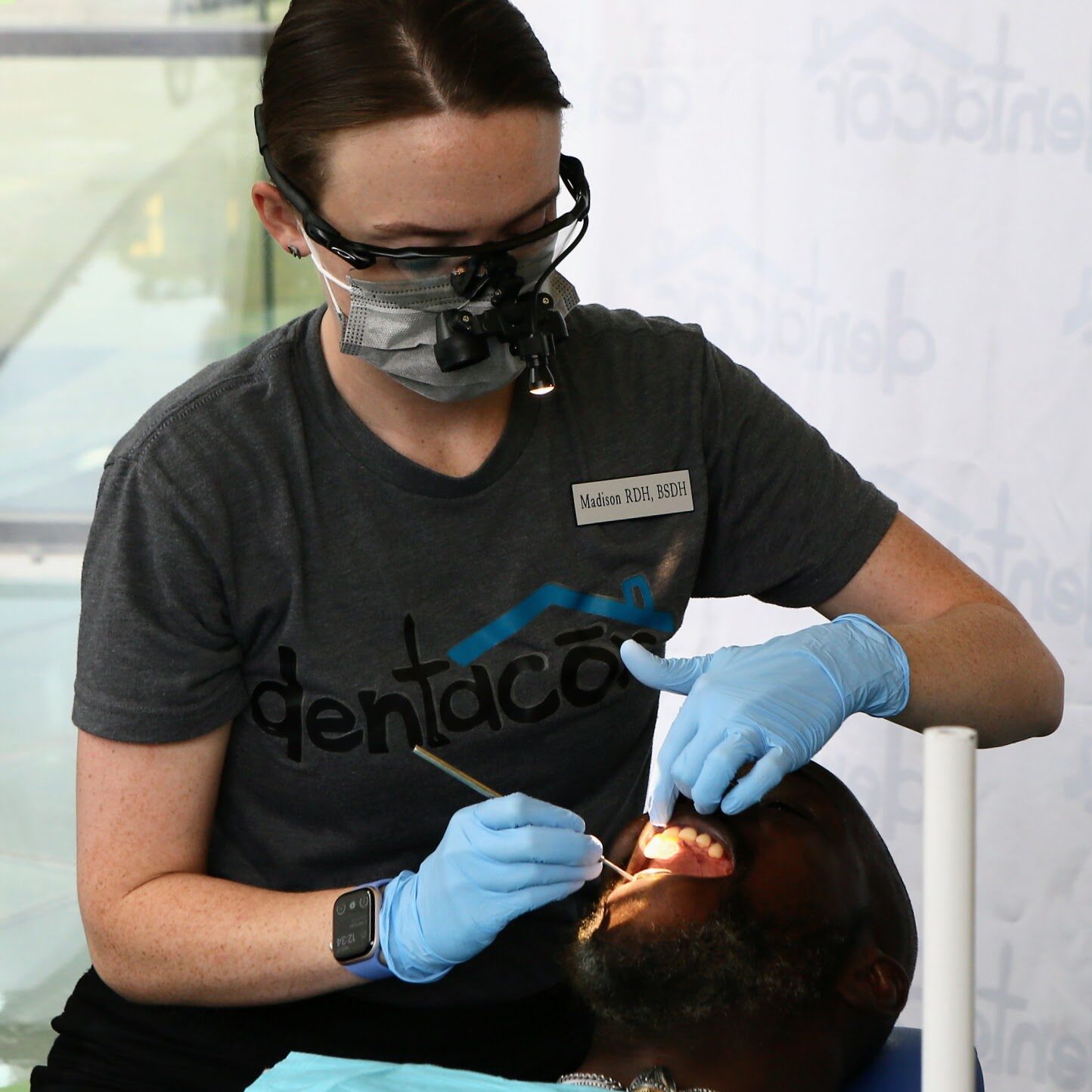
Imagine these people as if it was your mother, your sister, your brother, your son, your daughter,” she said. “If we do not help them, then who will?
Madison Busch is a mom and dental hygienist who calls Lehi, Utah home. She is married, recently celebrated her 10-year anniversary, and has two young children. “I love my job,” she said. “My job is kind of my hobby. If you love what you do, you don’t work a day in your life.”
Madison works with a mobile dentistry company that primarily serves people who have Medicaid. She explains that the company began serving senior centers where many residents had Medicaid and needed dentures but were unable to leave the facilities. The work expanded and now also provides services to the YMCA, YWCA, substance abuse recovery centers, and homeless shelters.
She described the importance of Utah’s Medicaid dental expansion in April 2025, which extended dental benefits to all adults. Prior to the expansion, “there was a huge gap of people that needed dental care but could not get it.” Without other options, people often had to endure pain and put off treatment until it was so severe they could not manage it anymore. When the pain became unbearable, “they would go to the emergency room, or they would, even worse, try to treat themselves.”
One of the most common concerns that Madison takes care of is periodontitis, chronic inflammation of the gums. Nearly all of her patients have periodontitis, “ranging from mild to severe.” Treating this inflammation is essential because chronic gum disease can have serious health consequences. She emphasized that gum health is crucial to overall health, explaining that “periodontitis is linked to heart disease, diabetes, stroke, respiratory diseases, kidney disease, certain types of cancers, and dementia. It’s also associated with pregnancy complications like preterm birth and low birthweight.” In addition to putting people at risk for these serious health conditions, periodontitis itself can be painful.
On top of gum disease, some of Madison’s client’s teeth have “been so decayed that they have broken off. This leaves open wounds, essentially, in their mouth—open canal spaces where bacteria can constantly go in and out.” This situation is both painful and dangerous because “bacteria is able to get into the bloodstream very easily.” Those in this situation are “desperate for help. They are in pain, and they don’t know where to go.”
She shared that this pain sometimes prompts people to take their dental care into their own hands. “People go to extreme measures to try to not be in pain,” Madison said. “Can you imagine grabbing a tool from your garage because your mouth hurts, and trying your best to yank it out?” The thought breaks her heart. Still, she emphasizes prevention: “we can help prevent this with a little bit of education and getting them to a healthy baseline.”
Madison has also seen the difference that dentures can make for members of the unhoused population. Because they were left with no other options, many of Madison’s clients have had their teeth removed in emergency departments and have lived without them for years. As a result, “their profile sinks in, the way that they speak is different, what they can eat is limited, so their health begins to decline. They’re self-conscious about it, and some have told me it’s hard for them to get a job. They cannot be a waiter or a waitress, because they’re smiling at people, and that influences tips.” However, “once you get the denture, you see their face totally change.” Their profile changes, and they begin “to look like somebody who has their life together. I think helping them get that first step, it gives them motivation.” For this reason and more, “Medicaid has helped a lot of this population” and really “got the ball rolling for them.” This work is necessary, she shares, because “you lose your humanity if you lose your teeth.”
Madison has noticed that word of mouth seems to spread awareness about Medicaid’s dental benefits. “These people are in their community and they’re like, ‘Hey, you got teeth now! How’d you do that?’ ‘Oh! I got Medicaid, and they paid to get me where I am today.’”
Madison has also seen how dental care supports people in recovery. Serving people in substance abuse recovery centers, Madison sees that her clients are “trying so hard to get away from this disease—this addiction. They are trying to better themselves.” They say to Madison, “I feel like I’m getting better, but I still look like I’m not well.” She described that being able to provide dental care in these settings is important for healing.
She also spoke about the proposed Medicaid work reporting requirements and the challenges that they would create for her patients. “A lot of the population that I see, they don’t have jobs. It’s not because they do not want to. There are a lot of people that want to better their situation, but they cannot do it alone. They may be physically unwell or mentally unwell. They need help from someone to kind of springboard that change.”
Madison also described the barriers people face before they can hold steady employment. “You cannot be sleeping on the street and expect to wake up on time to get somewhere. You need transportation. It is multifactorial. You cannot just tell people, “Go get a job,” and take away the help they need to get that job. They need to have their physical and mental health and dental health taken care of before they can go do those things.”
For Madison, it all comes down to compassion. “Imagine these people as if it was your mother, your sister, your brother, your son, your daughter,” she said. “If we do not help them, then who will?”
Add your voice to help us continue to push for the best health and health care for all.
SHARE YOUR STORY